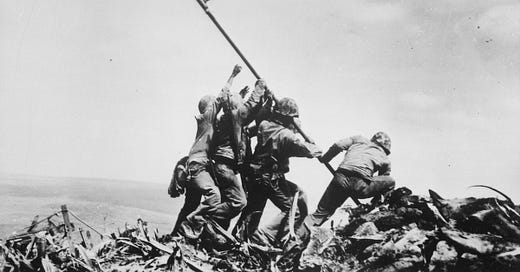By Chuck Warren
A Spanish philosopher once wrote, “Those who cannot remember the past are doomed to repeat it.” Or if you prefer to buy American, Mark Twain also said, “History doesn’t repeat itself, but it often rhymes.” I don’t know if we are repeating history or allowing it to rhyme, but bad things are happening again.
The 1920s and 1930s were the most tumultuous times in modern history. European governments were losing legitimacy. Democrats in Japan lost the argument to the imperialists, and the imperialists invaded China. And America had had enough of being involved with the world's affairs and withdrew its military from the German Rhineland.
Here are the key events that preceded World War II:
1922: Mussolini becomes the prime minister of Italy
1923: U.S. military ends its peacekeeping mission in Rhineland
1931: Japan invades Manchuria
1933: Hitler becomes the chancellor of Germany
1935: Italy invades Abyssinia
1936: Hitler remilitarizes the Rhineland
1936: Germany and Japan sign a cooperation pact
1936: Civil war breaks out in Spain, and fascists and communists get involved on opposite sides
1937: Japan invades the rest of China
1938: Hitler invades Czechoslovakia with blessings from Britain and France
1938: Hitler annexes Austria
1939: Hitler and Mussolini sign a defense treaty
1939: Hitler annexed Poland, and Britain and France declare war on Germany
1940: Hitler invades France
1941: Japan attacks Pearl Harbor, and America enters the war
Where do you put the pin at the beginning of World War II? Most American and European historians would say that it started with the invasion of Poland. But if you’re from Asia, you would say that it started in 1931. If you are from Africa, you’d say it started in 1935. For Americans, it started in 1941.
It is difficult to say when exactly the war started because the escalation was gradual and slow at first, before suddenly, the world found itself at war.
One thing about these events is interesting: Freedom-loving democracies stood by and watched.
Here are the events of recent years:
2011: Civil war breaks out in Syria
2011: Civil war breaks out in Africa
2012: Xi Jinping becomes the leader of China, promising reunification with Taiwan
2013: Iran intervenes in Iraq and Syria
2014: Putin annexes Ukrainian Crimea and invades Donbas
2015: Russia intervenes in Syria
2018: Russian mercenaries intervene in the Libyan civil war
2019: Turkey invades Syria
2020: India and China engage militarily over a border dispute, and dozens are killed
2020: Azerbaijan invades Armenia
2021: America withdraws from Afghanistan, and the Taliban takes over
2021: Iran and China sign a security agreement
2022: Russia and China sign “unlimited partnership” agreement
2022: Russia invades the rest of Ukraine
2022: China conducts military drills in the Taiwan Strait, triggering the Fourth Taiwan Crisis
Azerbaijan escalates its war with Armenia
2023: Hamas, an Iran proxy, invades Israel, and the other Iran proxies, Hezbollah and the Houthis, start firing at Israel and close the Red Sea
2024: Israel invades Lebanon and Yemen’s airspace in self-defense
2024: Iran and Israel exchange fire on two separate occasions
2025: Iran and Russia sign a security agreement
2025: India and Pakistan have a brief military exchange
Well, events started happening slowly and are happening really fast again.
World War II was a series of regional conflicts that merged into one big war. Regional conflicts, small and big, are happening again. Just like the 1930s, all the bad guys are also signing cooperation agreements with each other.
There is one difference: We are not entirely absent anymore. We have intervened to stop the Russians in Ukraine. We minimally intervened in Syria and Iraq (though not nearly enough). We have helped Israel and intervened to stop Iran’s attacks. We are supplying arms to Taiwan, too.
Also, when you look at the democracies in Europe and Asia, many of them are also losing legitimacy. Look at the results of German, British, French, Austrian, Czech, Slovenian, South Korean, etc., elections. The voters keep saying that the status quo is not working, and few politicians are listening, just like Europe in the 1920s and 1930s. And when responsible politicians don’t listen to the legitimate demands of the people, voters eventually turn to irresponsible ones.
The fire around the world is spreading, and we are slowing down the expansion, but not stopping it altogether. World War III is too awful to think about — so nobody is thinking about how it could happen soon.
America needs to wake up, and it needs to wake up its allies too. True enough, it will be expensive to reverse these trends and stop World War III, but it will be much more expensive to win it. And it will be catastrophic to lose it.
Which brings me to one of my favorite Roman maxims: “If you want peace, prepare for war.” Our peaceful world is very fragile. The only way not to send our children to another great war is by preparing for a great war.
Note: the opinions expressed herein are those of Chuck Warren only and not his co-host Sam Stone or Breaking Battlegrounds’ staff.





